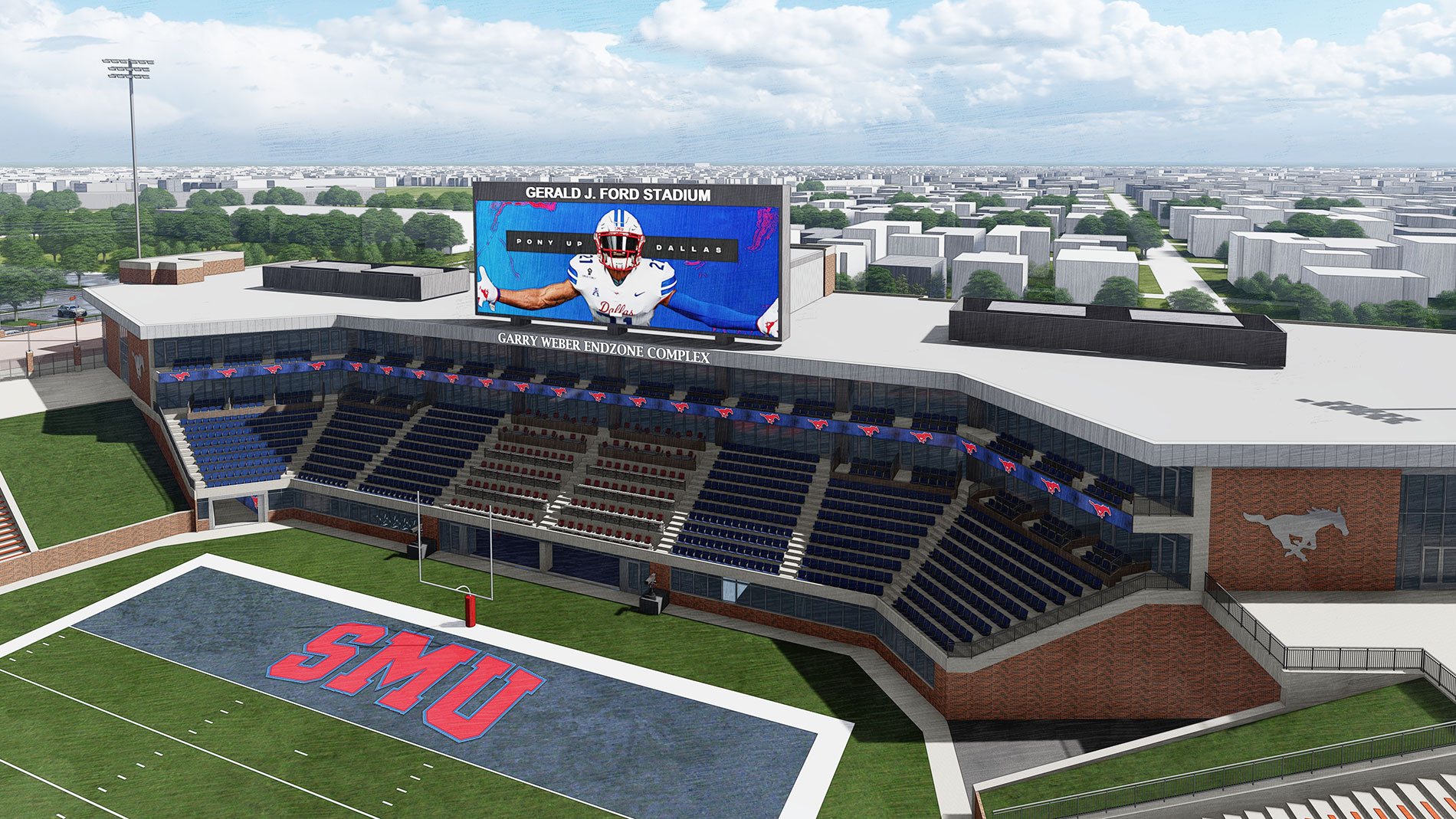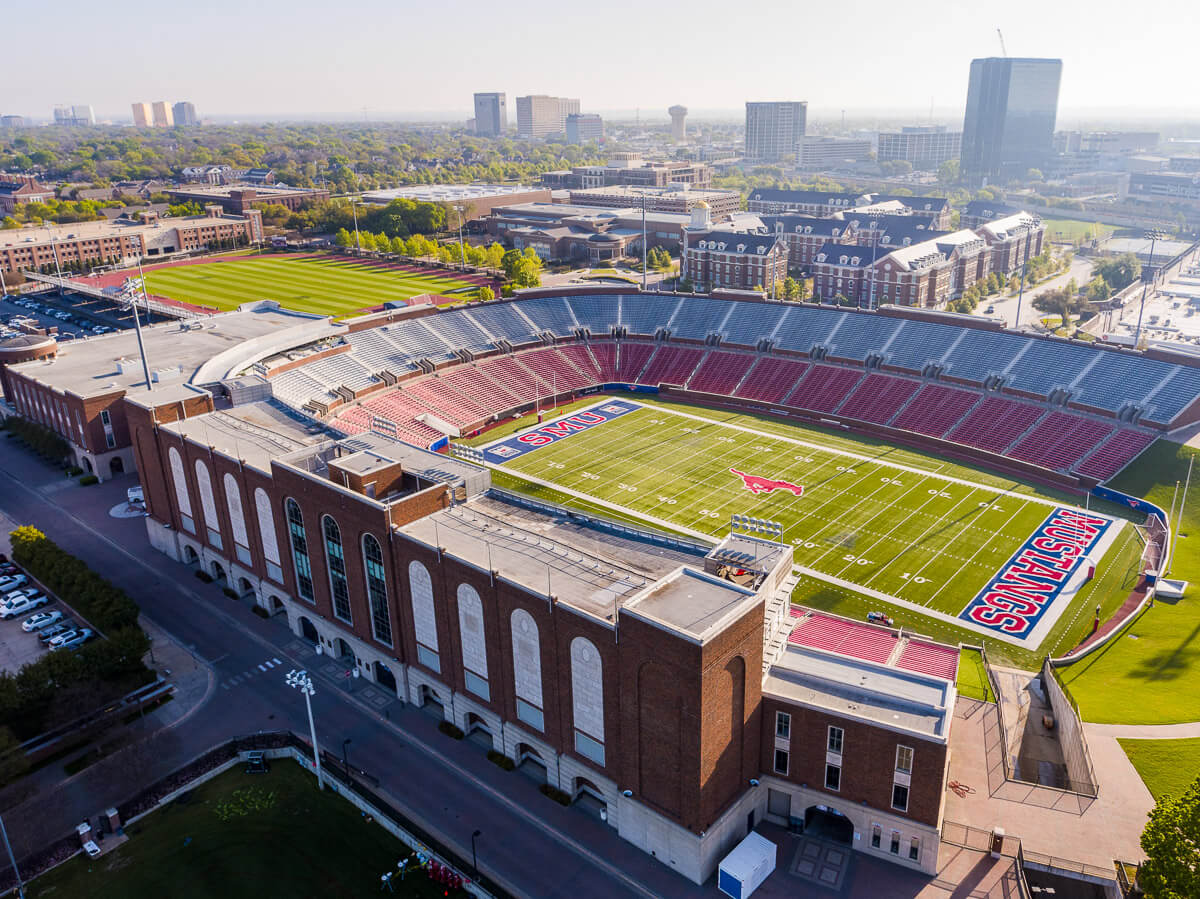Gerald J. Ford Stadium, located in Dallas, Texas, is a remarkable sports facility and the proud home of the Southern Methodist University (SMU) Mustangs football team. Opened in 2000 and offering a seating capacity of 32,000, this modern and spacious stadium boasts state-of-the-art amenities for its spirited fans and talented athletes. As part of the SMU campus, the stadium plays a significant role in fostering the university’s strong athletic legacy.
The venue features a distinctive bowl-shaped design with stands on the west, east, and north sides. With future expansion plans in place, the stadium has the potential to accommodate up to 45,000 spectators by enclosing the horseshoe on the south end. Contributing to a vibrant college football atmosphere, Gerald J. Ford Stadium has become a symbol of pride for the entire SMU community.
Currently, there’s an ongoing $100 million fundraising drive to construct a new 192,500-square-foot Garry Weber End Zone Complex at Gerald J. Ford Stadium, thanks to a generous $50 million commitment from the Garry Weber Foundation. As the largest gift in SMU Athletics history, this development is set to elevate the stadium’s facilities to new heights and continue to inspire the Mustangs to excel on the field.
History
Initial Construction

Gerald J. Ford Stadium, located in University Park, Texas, opened its doors in 2000 as the home of the SMU Mustangs football team. With a capacity of 32,000, the stadium has a horseshoe configuration and an open south end zone adjacent to Mockingbird Lane. The stadium is owned by Southern Methodist University and serves as the primary venue for their games.
On September 24, 2010, the regular season attendance record was set at Gerald J. Ford Stadium, with 35,481 people watching the TCU Horned Frogs face the SMU Mustangs in the Battle for the Iron Skillet. TCU won the game and the Iron Skillet with a score of 41-24.
Stadium Renovations

In recent years, significant renovations have been planned for Gerald J. Ford Stadium thanks to generous donations. A $50 million commitment from the Garry Weber Foundation, established by former Mustang football letterman Garry A. Weber ’58, marked the largest gift in the history of SMU Athletics. This donation supports a $100 million drive for a new 192,500-square-foot Garry Weber End Zone Complex at the stadium, signalling a bright future for the Mustangs and their fans.
Facilities
Playing Surface

The Gerald J. Ford Stadium has a playing surface designed to provide a high-quality experience for the Southern Methodist University Mustangs football team. As part of the initial phase of SMU’s $150 million comprehensive facilities upgrades, the stadium will also be getting an outdoor natural grass football practice field to further enhance the playing surfaces available to the team.
Seating Capacity

Gerald J. Ford Stadium has a seating capacity of 32,000 spectators. This ensures there is plenty of room for enthusiastic fans to support their SMU Mustangs during games. The stadium has a horseshoe configuration with an open south end zone adjacent to Mockingbird Lane, which contributes to its unique design.
Other Amenities

In addition to the seating capacity and playing surfaces, Gerald J. Ford Stadium offers other amenities for the comfort and enjoyment of visitors:
- Luxury suites and club level seats: The stadium features 24 luxury suites and 600 club level seats, providing a premier experience for fans who prefer a more upscale setting during games.
- Garry Weber End Zone Complex: Backed by a $50 million commitment from the Garry Weber Foundation, the 192,500-square-foot Garry Weber End Zone Complex is planned for the stadium. This will enhance the overall event experience and support the athletic program.
- Doak Walker Plaza: A dedicated space for fans to gather and celebrate, the Doak Walker Plaza adds another layer of enjoyment to the stadium experience.
These amenities help provide a comfortable and enjoyable experience for fans attending games at Gerald J. Ford Stadium, home of the SMU Mustangs.
Notable Games

Over the years, Gerald J. Ford Stadium has hosted several notable games that have showcased the competitive spirit and talents of the SMU Mustangs. One memorable event was the highly anticipated Battle for the Iron Skillet rivalry game against TCU. This annual match-up draws large crowds and has been a highlight of the Mustangs’ home schedule.
In recent seasons, the stadium has welcomed premier opponents, such as the 2021 CFP participant and AAC Champion Cincinnati. SMU hosted Cincinnati for a thrilling Homecoming showdown on October 22, 2022, further elevating Gerald J. Ford Stadium’s reputation as a prime venue for college football action.
Additionally, the stadium has served as a stage for postseason action. In 2011, Gerald J. Ford Stadium hosted the Armed Forces Bowl, attracting attention from football fans nationwide. Furthermore, the stadium is now home to the annual First Responders Bowl held in December, providing yet another exciting opportunity for football enthusiasts to experience compelling matchups.
Outside of college football, the stadium has been a choice venue for Texas high school playoffs over the years. This showcases the versatility of Gerald J. Ford Stadium, as it can accommodate various levels of competition and meet the needs of diverse audiences.
In summary, Gerald J. Ford Stadium’s history is rich with notable games, from exciting rivalry matchups to significant postseason competitions. As the home of the SMU Mustangs, the stadium has undoubtedly delivered thrilling moments for football fans in the Dallas area and beyond.
Role in the Community

Gerald J. Ford Stadium plays a significant role in the community, acting as the home field for the Southern Methodist University (SMU) Mustangs football team. Located in University Park, Texas, the stadium has a capacity of 32,000 and sports a horseshoe configuration with an open south end zone. Built in 2000, the facilities have become a hub for sports enthusiasts and fans in the area.
The stadium also serves as a platform for economic development and support for SMU athletics. The Garry Weber Foundation has contributed $50 million, the largest gift in the history of SMU Athletics, towards a $100 million drive for a new 192,500-square-foot Garry Weber End Zone Complex. This expansion aims to enhance accessibility, functionality, and overall experience for student-athletes, fans, and the university.
In addition to hosting games and events, Gerald J. Ford Stadium welcomes visitors and potential investors inspired by the progress and future prospects of SMU athletics. The positive impact on the local community can be seen in the support and loyalty of residents rallying behind the Mustangs during home games.
Furthermore, the stadium acts as a focal point for alumni and supporters of SMU, bringing them together in a common space to share their passion for the university and Mustangs football. The stadium’s prominence in the area fosters a strong sense of unity and pride, building lasting relationships within the community.
Future Prospects

In the coming years, the Gerald J. Ford Stadium, home of the SMU Mustangs, is set for significant improvements and expansion. These enhancements aim to bolster the efficiency, occupancy, and functionality of the stadium while offering better accessibility and premium seating options for fans.
One of the driving forces behind the forthcoming expansion is a generous $50 million commitment from the Garry Weber Foundation, which has propelled a $100 million drive towards the project. This substantial contribution is the largest gift in the history of SMU Athletics and attests to the commitment for the growth of the University’s athletic facilities.
The primary focus of the development plan is the construction of the 192,500-square-foot Garry Weber End Zone Complex. This three-tiered facility will not only create a modern touch for the stadium but also provide enhanced spaces for strategy-building, team activities, and other resources for Mustang student-athletes, fostering their growth and development.
The expansion of Gerald J. Ford Stadium promises a positive impact on the Mustangs’ athletic program. By catering to better fan experiences and providing an environment more conducive to the development of student-athletes, SMU can attract more talent and continue to elevate the profile of their teams.

